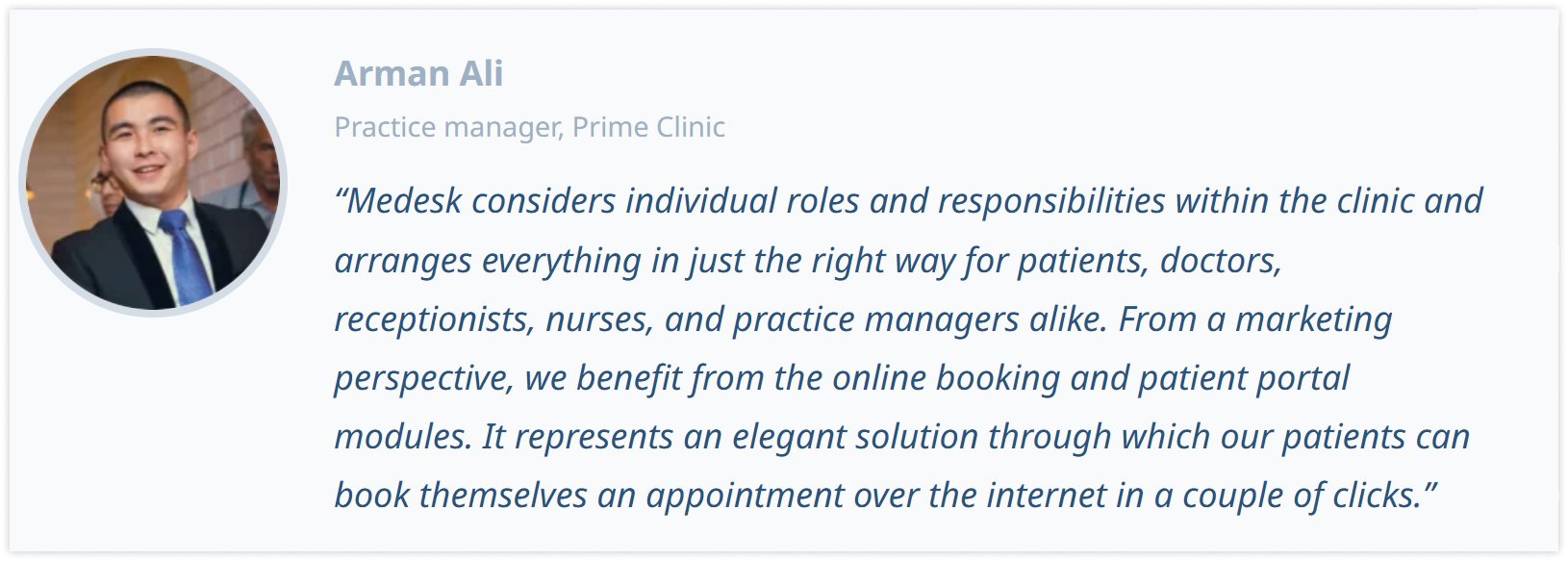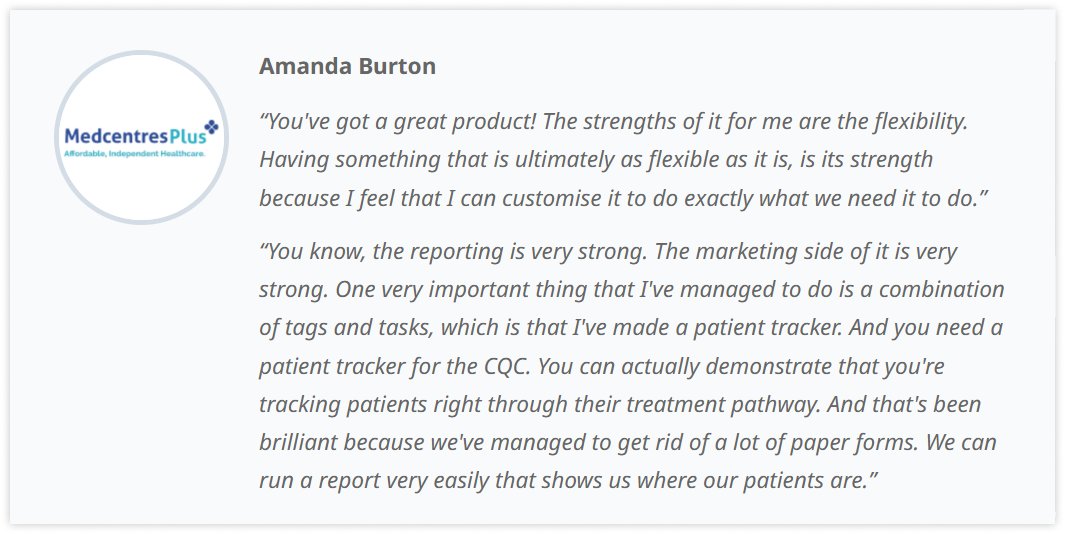Running a medical practice involves much more than just providing excellent healthcare services. Effective healthcare delivery also requires health records management, efficient workflows, and a solid understanding of patient record management.
Like any other business, a successful medical practice requires management and administration skills—billing, auditing, record keeping, and ensuring compliance with laws like the GDPR. With the right approach, you can manage patient records and streamline your practice for optimal patient care.
Does that mean you need a business degree to manage your clinical records?
Not really! With the right resources, such as a management system for medical records, you can improve your practice’s efficiency and enhance the care you provide.
Follow these top 9 medical practice management tips to optimize your workflow and ensure quality patient care in 2025! At the end of the article, we’ll provide you with a secret weapon that will boost your referrals.
Learn how to simplify your practice workflow and free up more time for patients with Medesk.
Open the detailed description >>Learn 3 Steps for Administrative Excellence
#1. Audit Every Year
As with any other business, it’s essential to audit the tools and practices of your clinic every year to ensure compliance with healthcare regulations and Good medical practice standards.
Each year introduces new challenges and updated tools. Our first patient records management tip is to evaluate the care records management processes in your clinic, what works well, and what software solutions you should consider adding to your arsenal.
For example, if you're still using paper records and facing difficulties with clinical decision-making or access to patient medical records, it might be time to explore electronic patient records (EPR) and other advanced information management systems.
These kinds of changes will ensure that your clinic is always improving its services.
#2. Focus on the Patient Experience
In healthcare, your patients are your customers, and ensuring a great patient experience is critical. Though healthcare often feels like public service, a healthcare clinic is still a place of business. Efficient record keeping and a focus on patient information management play a significant role here.
One way to ensure your patients’ satisfaction and reduce patient turnover is by using medical customer relationship management (CRM). With this tool, you can track appointment notes, patient demographics, preferences, and interactions and use them for more personalized care.
![[en] tag segment](/i/72VxjZlENfVhhN0AHAxZ2N/57ace8f82d468696061adbad087365e4/patinet_tag_segment__1_.png)
Electronic health records systems and solutions allow you to reduce paperwork and focus on patient care. These systems support clinical findings, referrals, and decision-making, ensuring a smoother experience for both clinicians and patients.
#3. Take Care of Your Employees
Your medical staff is the backbone of your practice. Healthcare professionals—from doctors to nurses—need to feel supported and valued. Without them, quality patient care and accurate health records management would be impossible.
Studies show that healthcare workers face high rates of burnout and stress, especially in the NHS and other healthcare systems. To retain top talent, provide employees with rest, professional development opportunities, and a supportive work environment. Offering training on the latest clinical records management techniques and data protection methods will also ensure the integrity of patient data.
Medesk helps automate scheduling and record-keeping, allowing you to recreate an individual approach to each patient, providing them with maximum attention.
Learn more >>Take Advantage of Patient Record System Features
#4. Use Telemedicine
Today everything is becoming more and more remote. With the prevalence of online education and the popularity of remote work, many people have come to expect online options in all aspects of their lives.
That’s why this medical practice management tip involves investing in telemedicine if you haven’t already. There are multiple reasons why you should provide this option to both your doctors and patients:
- Patients expect to have a remote consultation option and will turn to providers that can present it.
- Your doctors have more flexibility to work and access patient personal data from wherever they are.
- For practitioners working remotely, choosing to rent a virtual office can provide a professional address, secure mail handling, and a dedicated space for patient consultations when needed.
- You can quickly and easily provide consultations to patients who are in quarantine.
- You can provide service to patients who are either far away or unable to come in for an appointment due to injury or disability.
#5. Utilize Medical Billing Software
Many doctors aren’t familiar or comfortable with handling the financial aspect of running a medical practice. Therefore—considering how important payments are to any business—our next medical practice management tip is to use billing software. Medical billing software can automate the entire payment process, reduce errors, and ensure that patient data is kept secure.
Integrating a records management system with your billing software also allows for easy tracking of payments and insurance claims, leading to faster payment processing and fewer disputes.
This is particularly essential for compliance with the Data Protection Act 2018 and ensuring that sensitive personal data is protected at all times.
![[uk] Online booking stripe](/i/3uTILvmZqeotOeayKgymoa/36754dc342c168630907d0465866e05b/Confirmed__1_.png)
#6. Improve Scheduling
Proper scheduling is vital to running a clinic. When done right, you can increase clinicians productivity and efficiency, receive more patients daily, and improve coordination between departments and individual staff members.
But despite how important it is, many practice managers still don’t allocate enough resources to set up a proper scheduling system. Trust us when we say that this medical practice management tip will save your clinic loads of time and money:
Hire a highly qualified professional to handle your scheduling needs and/or invest in appointment scheduling software to automate the process in real time.
An online booking system will make scheduling appointments quicker and easier for both your patients and your staff. It improves the overall patient retention and reduces appointment no-shows.

Invest in Ongoing Training and Security
#7. Strengthen Security
One of the most useful medical practice management tips you’ll ever receive is to strengthen your privacy and security systems. With how sensitive and confidential health information is, a data breach can be seriously damaging to both your patients and your clinic’s reputation.
Implement robust information governance and data protection protocols, such as encryption, two-factor authentication, and audit trail features in your management system. Ensure staff members are trained in General Medical Council (GMC) standards and understand the importance of GDPR in protecting personal data.
Discover more about the essential features of Medesk and claim your free access today!
Explore now >>#8. Invest in Training
We’ve already talked about how important it is to take care of your employees. Another related medical practice management tip is to invest time and money in the professional training and development of your staff.
Especially when it comes to medicine, education is never really completed. On the contrary, it is an ongoing process that your entire team should have an opportunity to take part in.
This training can be in the form of medical conferences and courses or technical training for whatever hardware or software your clinic uses.
When it comes to EHR, for example, it can take weeks to achieve full competency. And a lack of technical know-how can contribute to psychological stress and a reduced feeling of fulfilment at work.
#9. Use Practice Management Software
Most doctors have little or no management training, meaning they don’t necessarily have all the skills to manage the business end of a healthcare practice. The use of practice management software helps simplify many of the administrative tasks involved in running a healthcare practice.
With practice management software, you can automate most of the business aspects of running a clinic, such as:
- Medical billing
- Scheduling
- Inventory management
- Reporting and analytics
- Customer relationship management
When choosing a management system, ensure it has the necessary features for clinical records management, patient data retention, and integration with electronic patient records. With the right software, you can improve productivity, enhance information governance, and focus on providing high-quality care.
Try Medesk Practice Management Software
For efficient patient record management, choose an EHR. This type of software will help you fill and store information, prescribe to patients, schedule appointments, and give you access to a personal portal.
However, an EHR alone won't give you a complete picture of how the business is performing. You need practice management software to analyse practice KPIs, generate visual reports, do your bookkeeping, and grow your business.
The good news is that you don't need two separate pieces of software. Your secret weapon is Medesk, a PMS with a built-in patient records management module. With our platform, you not only have full control over your patients' data, which is stored in a secure space on the cloud, but you also get a complete business management tool.

- Need more customers? The analytics module will show you which acquisition channels are working best, and the built-in CRM will send out messages to patients.
- Don't want to bother with insurance and invoices? A couple of clicks inside the patient record will do it all for you, thanks to integrations with Healthcode, Stripe and Xero.
- And if you value order and accuracy, task management will take the pressure off your head and remind you of all important events, appointments, and tasks with automatic alerts.
Sign up for a 15-day trial of Medesk absolutely free today. Just 5 minutes to register, and you are open to all modules of the platform. Join a community of 15,000 satisfied practitioners and revolutionize your practice with Medesk—your free trial awaits!
